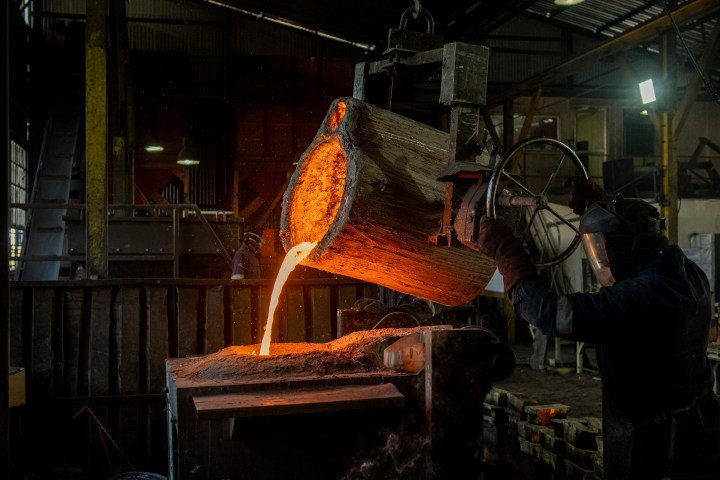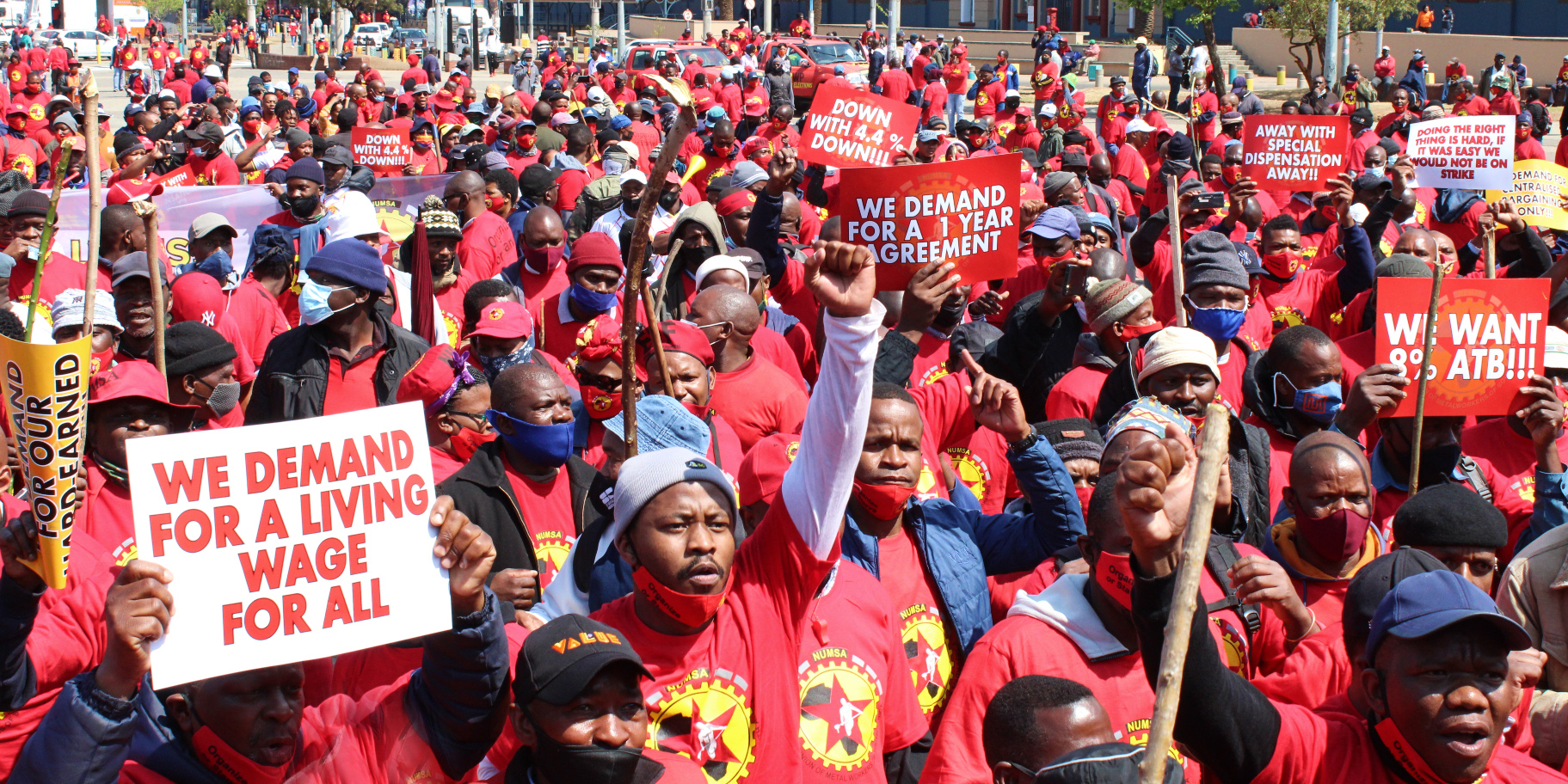LABOUR PAINS
High noon for tense pay rise talks in SA’s struggling steel industry

Employers in the steel industry and trade unions representing workers will meet again on Wednesday, 24 April, for the second round of pay rise negotiations. Already, trade unions have tabled above-inflation pay rise demands for 2024. This is set to make employers nervous.
Pay rise demands in SA’s beleaguered steel industry for 2024 are rolling in, with most trade unions asking employers for above-inflation increases that have the potential to disrupt the stability of labour relations.
Trade unions representing some of the steel industry’s 190,000 workers have pitched their pay rise demands of between 7% and 12% for 2024 — a scale above the SA Reserve Bank’s inflation expectation of 6% this year.
Trade unions and employers in the steel and engineering industry kicked off pay rise talks on 10 April at the Metal and Engineering Industries Bargaining Council, where both parties negotiate the terms of employment in the industry.
The second round of talks is scheduled for Wednesday, 24 April, at the bargaining council where employers are expected to try to convince trade unions to lower their pay rise demands because of the dire financial situation of the steel industry. Employers will do this while ensuring that negotiations with trade unions do not break down, which would push them to embark on a strike — similar to the one in October 2021, when steelworkers downed tools for nearly three weeks.
Read more in Daily Maverick: Numsa’s indefinite strike will bring South Africa’s beleaguered steel industry to its knees

Hundreds of Numsa workers march from Mary Fitzgerald Square to the Metal and Engineering Industries Bargaining Council office in Marshalltown, Johannesburg, to hand over the memorandum of their demands on 5 October 2021. It was part of the national strike by steel engineering workers whose demands include an 8% wage increase. (Photo: Masego Mafata)
The final round of negotiations is set to be held on 8 May, when trade unions and employers will have to sign a new pay rise agreement that replaces the existing one, which expires on 30 June. The existing agreement — gazetted by Minister of Employment and Labour Thulas Nxesi — paved the way for workers to receive pay increases equivalent to 5% each year in 2022 and 2023.
Now, trade unions want a higher percentage for both 2024 and subsequent years. The National Union of Metalworkers of SA (Numsa), the biggest trade union in the steel industry, has tabled a demand for a 7% pay rise for 2024, and 6% for 2025 and 2026.
Numsa spokesperson Phakamile Hlubi-Majola said the trade union’s demands were justified considering the financial pressures that workers faced as a result of a high inflation environment.
“In 2022, all workers across all grades received increases lower than the annual average inflation of 6.9%. Workers, therefore, experienced a decrease in their salaries [of] between 1.9% and 1.4%. In 2023, [most workers] received increases lower than the average annual inflation of 6%. For two consecutive years, workers in the industry faced losses in income,” Hlubi-Majola said.
The trade union has also urged industry employer bodies — including the National Employers’ Association of SA (Neasa) and the Steel and Engineering Industries Federation of Southern Africa (Seifsa) — to table “a meaningful wage offer based on the actual rates of pay”. In the steel and engineering industry, workers earn a minimum of R55.57 per hour up to R93.44 per hour, depending on their employment level.
Based on the mandates received from their members, other trade unions have also tabled above-inflation demands in 2024 to be applied across the board or regardless of a worker’s employment level.
The Metal and Electrical Workers’ Union of SA has asked for a 12% increase, the South African Equity Workers Association has asked for 10% and Solidarity for 9%. The unions have asked for other sweeteners, including increases in sick day allowances, housing assistance, double pay for overtime, transport allowances and a host of other benefits.
They are also pushing for a multiyear agreement, which ensures that workers are guaranteed pay increases over a couple of years and makes it easier for employers to plan for an increase in remuneration costs over a longer period.
Employers’ response
Some employers say that going into the 2024 wage negotiations, workers have to be realistic in their expectations, considering that SA’s steel industry is nearly on its knees.
The financial situation of steel producers has been hampered by Eskom blackouts, the logistics crisis at Transnet, a weak economy in South Africa and China which has caused the demand for steel to falter, and a squeeze in international steel prices. As a result, some steel producers, such as ArcelorMittal, are already warning of job losses in the industry.
Read more in Daily Maverick: ArcelorMittal sees no way to avoid the closure of its steel operations in SA, and looming job losses
Gerhard Papenfus, the CEO of Neasa, has always argued that pay rise negotiations should take into account the financial situations of steel and engineering companies, and trade unions should moderate their expectations accordingly.
Papenfus has urged workers to weigh two choices: either receive reasonable wage increases and keep their jobs, or receive high wages that will drive up the operational costs of factories, resulting in their closure and job losses.
In his latest update, Lucio Trentini, the CEO of Seifsa, the sector’s largest employer body, said the last pay rise talks were “positive”, adding that the unions were prepared to put “the interests of the metals and engineering sector — and, indeed, the interests of our country — first. We remain cautiously optimistic that consensus will be found.” DM



















Shut it all down and start over with people who actually WANT to work
Steel and engineering industries are one for the critical economic sectors for aspirational developmental goals and the creation of gainful employments. At this time and moment of dire economic circumstances, in South Africa, this calls for pragmatic approach at the bargaining council negotiations. A genuine social compact, underpinned with mutual interests and trust, are a prerequisite for any meaningful engagement and mutually acceptable outcomes. At stake is sustainability of the industries as well as jobs and the industries’ capabilities in equal measures.